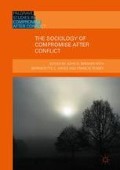Abstract
Described as a victor’s peace, the post-war situation in Sri Lanka has been characterised as one of deep division between the various ethnic groups with little attempt to address the roots of the conflict. With this finding in mind and using recent survey data, this chapter focuses on relations between the various self-identified ethnic communities—Sinhalese, Tamil, Sri Lankan—and their support for a range of mechanisms to deal with Sri Lanka’s violent past. The results suggest that not only do the various ethnic groups display little understanding of each other’s cultural traditions and are highly segregated in their living arrangements, but this is particularly the case when the Sinhalese and Tamil communities are considered. Similar findings emerge when views concerning how to deal with the past are considered. While the vast majority adopted a non-forgiving, or vengeful, stance in relation to those with a violent past, and a slight majority were opposed to amnesty, this is again particularly so among the Sinhalese and Tamil communities. This is not to deny, however, their somewhat more positive, or unifying and hopeful, view of interethnic relations in the future, particularly among those who endorsed a Sri Lankan identity.
Access this chapter
Tax calculation will be finalised at checkout
Purchases are for personal use only
Bibliography
Brewer, J. D. (2010). Peace Processes: A Sociological Approach. Cambridge: Polity Press.
Brewer, J. D. (2015). Northern Ireland: Religion, Religiosity and Politics in a Changing Society. In S. Hunt (Ed.), Handbook of Global Contemporary Christianity (pp. 208–230). Leiden: Brill.
Brewer, J. D., & Hayes, B. C. (2015a). Victimisation and Attitudes Towards Former Political Prisoners in Northern Ireland. Terrorism and Political Violence, 27, 741–761.
Brewer, J. D., & Hayes, B. C. (2015b). Victimhood and Attitudes Towards Dealing with the Legacy of a Violent Past: Northern Ireland as a Case Study. British Journal of Politics and International Relations, 17(3), 512–530.
Brewer, J. D., Hayes, B. C., Dudgeon, K., Mueller-Hirth, N., Teeney, F., & Wijesinghe, S. L. (2018). The Sociology of Everyday Life Peacebuilding. London: Palgrave.
Cobban, H. (2007). Amnesty After Atrocity? Healing Nations After Genocide and War Crimes. London: Paradigm.
DeVotta, N. (2011). Sri Lanka: From Turmoil to Dynasty. Journal of Democracy, 22(2), 130–144.
DeVotta, N. (2014). Parties, Political Decay and Democratic Regression in Sri Lanka. Commonwealth and Comparative Politics, 52(1), 139–165.
DeVotta, N. (2016). A Win for Democracy in Sri Lanka. Journal of Democracy, 27(1), 152–166.
Hanniffa, F. (2016). Who Gave These Fellows Their Strength? Muslims and the Bodu Bala Sena in Post-War Sri Lanka. In A. Amarasingam & D. Bass (Eds.), Sri Lanka: The Struggle for Peace in the Aftermath of War (pp. 109–127). London: Hurst and Company.
Hashim, A. S. (2013). When Counterinsurgency Wins: Sri Lanka’s Defeat of the Tamil Tigers. Philadelphia: University of Pennsylvania Press.
Hoglund, K., & Orjuela, C. (2011). Winning the Peace: Conflict Prevention After a Victor’s Peace in Sri Lanka. Contemporary Social Science, 6(1), 19–38.
Human Rights Watch. (2009). Selling Justice Short: Why Accountability Matters for Peace. New York: Human Rights Watch.
Lindbert, J., & Herath, D. (2014). Land and Grievances in Post-Conflict Sri Lanka: Exploring the Role of Corruption Complaints. Third World Quarterly, 35(5), 888–904.
McCullough, A. (2014). Power-Sharing and Political Stability in Deeply Divided Societies. London: Routledge.
McCullough, M. E., Pargament, K. I., & Thoresen, C. E. (Eds.). (2000). Forgiveness: Theory, Research, and Practice. New York: Guildford.
Olsen, T. D., Payne, L. A., & Reiter, A. G. (2010). Transitional Justice in Balance: Comparing Processes, Weighing Efficacy. Washington, DC: United States Institute of Peace Press.
Orjuela, C. (2008). The Identity Politics of Peacebuilding: Civil Society in War-Torn Sri Lanka. London: Sage.
Raghavan, S. (2016). Buddhism in Sri Lanka: The Post-War Militancy of Sinhala Sangha. In A. Amarasingam & D. Bass (Eds.), Sri Lanka: The Struggle for Peace in the Aftermath of War (pp. 91–108). London: Hurst and Company.
Richmond, O. (2005). The Transformation of Peace. Basingstoke: Palgrave.
Ruwanpura, K. N. (2016). Post-War Sri Lanka: State, Capital and Labour and the Politics of Reconciliation. Contemporary South Asia, 24(4), 351–359.
Selvarajah, S. (2016). Threat Image Construction in the Sri Lankan Media and Its Implications for Peace Communication. In A. Amarasingam & D. Bass (Eds.), Sri Lanka: The Struggle for Peace in the Aftermath of War (pp. 73–87). London: Hurst.
Seoighe, R. (2016). Nationalistic and Authorship and Resistance in Northeastern Sri Lanka. Society and Culture in South Asian, 2(1), 1–30.
Seoighe, R. (2017). War, Denial and Nation-Building in Sri Lanka: After the End. London: Palgrave.
Tonge, J. (2014). Comparative Peace Processes. Cambridge: Polity Press.
United Nations Report of the Secretary-General’s Panel of Experts on Accountability in Sri Lanka. (2011, March 31). New York: United Nations. http://www.un.org/news/dh/infocus/sri_lankaPOE_Report_full.pdf. Accessed 20 Dec 2016.
Wiebelhaus-Brahm, E. (2010). Truth Commissions and Transitional Societies: The Impact of Human Rights on Democracy. London: Routledge.
Author information
Authors and Affiliations
Corresponding author
Editor information
Editors and Affiliations
Rights and permissions
Copyright information
© 2018 The Author(s)
About this chapter
Cite this chapter
Hayes, B.C., Brewer, J.D. (2018). The Road to Compromise in Sri Lanka. In: Brewer, J. (eds) The Sociology of Compromise after Conflict. Palgrave Studies in Compromise after Conflict. Palgrave Macmillan, Cham. https://doi.org/10.1007/978-3-319-78744-2_7
Download citation
DOI: https://doi.org/10.1007/978-3-319-78744-2_7
Published:
Publisher Name: Palgrave Macmillan, Cham
Print ISBN: 978-3-319-78743-5
Online ISBN: 978-3-319-78744-2
eBook Packages: Law and CriminologyLaw and Criminology (R0)

